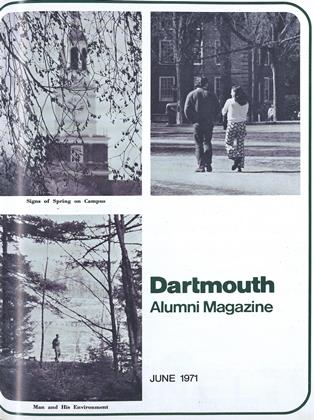Last year about this time, Tony Lupien had a baseball team that had pitchers, hitters and fielders. The men in Dartmouth's pinstripes won 24 games and played in the NCAA World Series. This spring the pitchers were still pitching but the hitters weren't hitting and the fielders were plagued with moments of inconsistency.
The result: At this writing, a 17-11 record and a good shot at the third 20-win season for the Indians in the past four years. Really not so bad, the 10th straight winning season for Dartmouth baseball.
"It's not our year to be lucky," said Lupien. "We've had our share of success, now it's someone else's turn."
"Someone else" in 1971 Eastern League baseball turned out to be Harvard. The Crimson, after dropping their last four league games (including one to Dartmouth), edged Cornell, 1-0, in an unprecedented playoff involving teams with unequal records (Harvard finished 9-5; Cornell, due to rainouts, was 7-4).
Princeton was third at 8-5-1. Dartmouth was next, 8-6. The closeness of the race has been unmatched since the EIBL became a 10-team league in 1948. Brown, in ninth place, finished 5-7-2.
The Indians got a victory over everyone in the EIBL except Cornell, which took a 3-1 decision at Ithaca despite a five-hitter by junior Pete Broberg, who struck out 11.
The inability to bunch hits and give the pitchers some breathing room was the basic problem this spring. With the exception of a 14-1 explosion against Boston College, during which Broberg set a Dartmouth record with 20 strikeouts (breaking the mark of 18 set way back in 1906 by Clarence Skillern '09 against Williams in a 16-inning game), the Green didn't score more than six runs in a game since returning from the southern trip.
The loss at Cornell was followed by a split at Army. The Cadets scrambled a 3-2 win in the opener and then Dartmouth won the nightcap with an unearned run in the ninth.
After a 10-4 non-league loss to Massachusetts, Harvard arrived at Red Rolfe Field. In the first game, Broberg did everything but win. He pitched a two-hitter and struck out 10. Unfortunately, the second hit was a misjudged fly ball that turned into a double and brought home the only run of the game for the Crimson in the 10th inning.
Griebel retaliated with a 5-1 win, spreading six hits and starting Harvard on a tailspin through the final two weeks of the season.
Broberg, who has had the major league scouts standing shoulder to shoulder behind the Rolfe Field back-stop all spring (he refused an offer of $175,000 to sign with the Oakland Athletics when he graduated from Palm Beach High in 1968), looked very good against Harvard and even better against Princeton a week later. He struck out 14 Tigers, including 13 in the first six innings, then came up with a two-out single in the last of the ninth inning to drive home third baseman Craig Conklin with the winning run in a 2-1 game.
That win kept Dartmouth in conten- tion for the EIBL crown but the bid for a third straight title went by the boards the next afternoon as Columbia came to town. The Lions, who had knocked over Harvard 7-6 the day before toppled Dartmouth 6-2 in the first game of the twin bill. It would have taken a Dartmouth sweep against Columbia while Harvard lost twice to Princeton (which it did) to keep the Indians in contention. So, after Griebel went down to his first loss of the season, John Prado made his first start and whipped the Lions, 3-0, with a two-hitter.
This has been a team laden with seniors and in a way it marks the end of an era. Over three seasons, with guys like Hannigan, Griebel, Hanna, Conklin, Prado, Bell, Russ Adams, Dave Dietz, and Bill Saumsiegle toiling with exceptional desire, Dartmouth has won more than 60 per cent of its baseball games.
Not a bad record in any league.
Southpaw Lloyd Ucko '72 has been atop man in both singles and doubles.
 View Full Issue
View Full Issue
More From This Issue
-
 Feature
FeatureMan and His Environment
June 1971 By ALVIN O. CONVERSE -
 Feature
FeatureRETIRING FACULTY
June 1971 By B.B. -
 Feature
FeatureWhat Price Clean Air?
June 1971 By Robert B. Graham '40 -
 Feature
FeatureTeaching at a Communist University
June 1971 By NOEL PERRIN -
 Feature
FeatureThe Marxist View of Overpopulation
June 1971 By Charles W. Collier '71 -
 Article
ArticleA Second Life Through Heart Surgery
June 1971 By Daniel L. Dyer '39
JACK DEGANGE
-
 Article
ArticleSWIMMING
FEBRUARY 1970 By JACK DEGANGE -
 Article
ArticleTRACK
APRIL 1970 By JACK DEGANGE -
 Article
ArticleOTHER FALL SPORTS
JANUARY 1971 By JACK DEGANGE -
 Article
ArticleWINTER SCENE
JANUARY 1973 By JACK DEGANGE -
 Article
ArticleBig Green Teams
January 1974 By JACK DEGANGE -
 Article
ArticleHeritage Tourism
NOVEMBER 1999 By Jack DeGange
Article
-
 Article
ArticleMasthead
August, 1923 -
 Article
ArticleEdinburgh Art Show
JUNE 1972 -
 Article
ArticleTuck School
MARCH 1972 By BOB KIMBALL T'48 -
 Article
ArticleVISITING VOICES
JANUARY | FEBRUARY 2014 By Junot Diaz -
 Article
ArticleThree Aleutian Love Poems
November 1946 By KIMBALL FLACCUS '33 -
 Article
ArticleThe Undergraduate Chair
January 1940 By R. E. Glendinning '40

